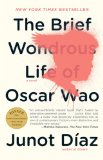Summary | Excerpt | Reading Guide | Reviews | Beyond the Book | Readalikes | Genres & Themes | Author Bio

A Novel
by Junot Diazone
GhettoNerd at the End of the World
1974-1987
the golden age
Our hero was not one of those Dominican cats everybody’s always going on about -
he wasn’t no home-run hitter or a fly bachatero, not a playboy with a million
hots on his jock.
And except for one period early in his life, dude never had much luck with the
females (how very un-Dominican of him).
He was seven then.
In those blessed days of his youth, Oscar was something of a Casanova. One of
those preschool loverboys who was always trying to kiss the girls, always coming
up behind them during a merengue and giving them the pelvic pump, the first
nigger to learn the perrito and the one who danced it any chance he got.
Because in those days he was (still) a “normal” Dominican boy raised in a
“typical” Dominican family, his nascent pimpliness was encouraged by blood
and friends alike. During parties - and there were many many parties in those
long-ago seventies days, before Washington Heights was Washington Heights,
before the Bergenline became a straight shot of Spanish for almost a hundred
blocks - some drunk relative inevitably pushed Oscar onto some little girl and
then everyone would howl as boy and girl approximated the hip-motism of the
adults.
You should have seen him, his mother sighed in her Last Days. He was our little
Porfirio Rubirosa.4
All the other boys his age avoided the girls like they were a bad case of
Captain Trips. Not Oscar. The little guy loved himself the females, had
“girlfriends” galore. (He was a stout kid, heading straight to fat, but his
mother kept him nice in haircuts and clothes, and before the proportions of his
head changed he’d had these lovely flashing eyes and these cute-ass cheeks,
visible in all his pictures.) The girls - his sister Lola’s friends, his mother’s
friends, even their neighbor, Mari Colón, a thirty-something postal employee
who wore red on her lips and walked like she had a bell for an ass - all
purportedly fell for him. Ese muchacho está bueno! (Did it hurt that he was
earnest and clearly attention-deprived? Not at all!) In the DR during summer
visits to his family digs in Baní he was the worst, would stand in front of Nena
Inca’s house and call out to passing women - Tú eres guapa! Tú eres guapa! - until
a Seventh-day Adventist complained to his grandmother and she shut down the hit
parade lickety-split. Muchacho del diablo! This is not a cabaret!
It truly was a Golden Age for Oscar, one that reached its apotheosis in the fall
of his seventh year, when he had two little girlfriends at the same time, his
first and only ménage à trois. With Maritza Chacón and Olga Polanco.
Maritza was Lola’s friend. Long-haired and prissy and so pretty she could have
played young Dejah Thoris. Olga, on the other hand, was no friend of the family.
She lived in the house at the end of the block that his mother complained about
because it was filled with puertoricans who were always hanging out on their
porch drinking beer. (What, they couldn’t have done that in Cuamo? Oscar’s mom
asked crossly.) Olga had like ninety cousins, all who seemed to be named Hector
or Luis or Wanda. And since her mother was una maldita borracha (to quote
Oscar’s mom), Olga smelled on some days of ass, which is why the kids took to
calling her Mrs. Peabody.
Mrs. Peabody or not, Oscar liked how quiet she was, how she let him throw her to
the ground and wrestle with her, the interest she showed in his Star Trek
dolls. Maritza was just plain beautiful, no need for motivation there, always
around too, and it was just a stroke of pure genius that convinced him to kick
it to them both at once. At first he pretended that it was his number-one hero,
Shazam, who wanted to date them. But after they agreed he dropped all pretense.
It wasn’t Shazam - it was Oscar.
Reprinted from The Brief Wondrous Life of Oscar Wao by Junot Díaz by arrangement with Riverhead Books, a member of Penguin Group (USA), Inc., Copyright © 2007 by Junot Díaz
Harvard is the storehouse of knowledge because the freshmen bring so much in and the graduates take so little out.
Click Here to find out who said this, as well as discovering other famous literary quotes!
Your guide toexceptional books
BookBrowse seeks out and recommends the best in contemporary fiction and nonfiction—books that not only engage and entertain but also deepen our understanding of ourselves and the world around us.